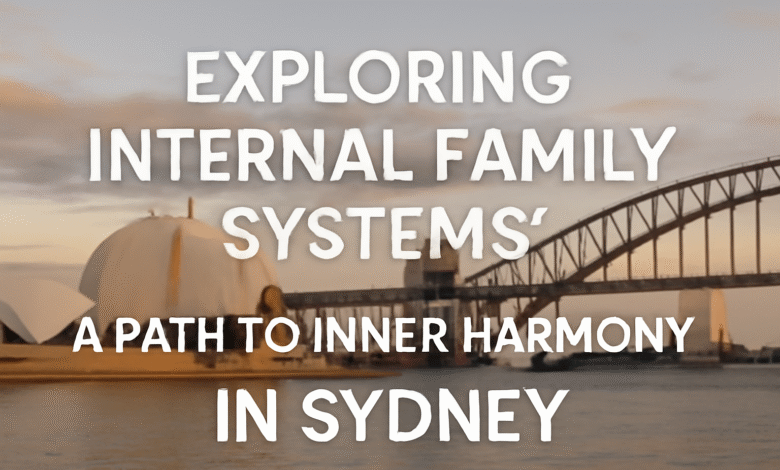Exploring Internal Family Systems: A Path to Inner Harmony in Sydney

In our fast-paced, often chaotic world, many of us struggle with feelings of inner conflict, stress, and emotional turbulence. We constantly battle within ourselves, striving for balance, peace, and clarity. This is where Internal Family Systems (IFS) therapy comes in, offering a powerful method to cultivate inner harmony by understanding the various parts of ourselves and how they interact.
IFS therapy, developed by Dr. Richard Schwartz in the 1980s, is a transformative approach that views the mind as made up of different “parts,” each with its own beliefs, emotions, and behaviors. The goal is not to eliminate these parts but to foster understanding, compassion, and integration among them. This approach can be particularly beneficial for individuals in Sydney who are looking for a path to deeper self-awareness and emotional healing.
What is Internal Family Systems Therapy?
At its core, Internal Family Systems therapy is based on the premise that our mind is like a family. We all have different “parts” within us, such as the inner critic, the wounded child, the caretaker, or the protector. These parts interact with each other in various ways, sometimes in harmony and other times in conflict. The key to IFS is recognizing that every part, no matter how challenging or destructive it may seem, has a positive intention for the person.
IFS focuses on helping people understand and communicate with these parts to achieve self-leadership and healing. Through this process, individuals can develop a more compassionate relationship with themselves, fostering emotional balance and inner peace.
How IFS Therapy Works
IFS therapy aims to create a dialogue between the therapist and the client, allowing the client to connect with their different internal parts. The therapist’s role is to facilitate this process, guiding the client through the exploration of these parts and helping them to understand the underlying fears, needs, and desires that shape their behaviors.
The process begins by identifying the parts that are most prominent or causing distress. For example, a person might have a part that is constantly critical, or another part that feels abandoned or rejected. IFS encourages clients to “get to know” these parts and explore their origin, often tracing them back to past experiences or trauma.
One of the most significant aspects of IFS therapy is the concept of the “Self.” The Self is the core of the person—an inner state of wisdom, compassion, and clarity. In a balanced state, the Self is able to lead and integrate the various parts of the system, bringing them into harmony. When the Self is activated, it can help heal wounded parts and create a sense of unity within.
Benefits of IFS Therapy in Sydney
IFS therapy offers numerous benefits for those seeking emotional healing and personal growth. Whether you’re dealing with anxiety, depression, trauma, or simply want to understand yourself better, IFS provides a unique and effective approach. Below are some of the key benefits:
1. Deepened Self-Understanding
IFS helps individuals better understand the different parts of themselves, leading to deeper self-awareness. This understanding can be transformative, as it allows people to recognize the complex inner dynamics that influence their behaviors, emotions, and reactions. By seeing themselves more clearly, individuals can make more informed choices and break free from negative patterns.
2. Increased Emotional Balance
One of the key outcomes of IFS therapy is emotional regulation. As individuals learn to engage with their parts in a more compassionate and mindful way, they are able to manage their emotions more effectively. This leads to greater emotional balance and resilience, helping individuals navigate life’s challenges with more ease.
3. Healing from Past Trauma
IFS is particularly effective for those who have experienced trauma or have unresolved emotional wounds. By accessing and healing wounded parts of the self, individuals can work through past pain and trauma. This process helps release the hold that negative past experiences may have on a person, leading to healing and liberation.
4. Strengthened Relationships
Through IFS, individuals learn to develop a compassionate relationship with themselves, which can improve their relationships with others. By understanding their internal dynamics, people are better able to communicate their needs, set boundaries, and engage in healthier interactions with those around them.
5. Enhanced Inner Harmony
Perhaps the most profound benefit of IFS therapy is the cultivation of inner harmony. As individuals work through the conflicts between their various parts, they move toward a state of greater inner peace. This sense of integration allows people to feel more aligned with their true selves, leading to a more fulfilling and authentic life.
IFS Therapy in Sydney: Finding the Right Support
In Sydney, many individuals are turning to IFS therapy as a way to gain deeper insight into themselves and resolve inner conflicts. If you’re considering this therapy, it’s essential to find a skilled and experienced therapist who can guide you through the process. IFS therapy requires a deep understanding of human psychology and compassion, so choosing a therapist who is trained in this modality is crucial.
When seeking IFS therapy Sydney, consider factors such as the therapist’s experience, approach, and comfort level. It’s important to feel safe and supported throughout the process, as this allows for deeper healing and growth. Working with a therapist who resonates with your values and needs can make a significant difference in your therapeutic journey.
Whether you’re dealing with past trauma, anxiety, depression, or simply want to explore your inner world, IFS therapy in Sydney can offer a path to healing and self-discovery.
What to Expect During an IFS Therapy Session
An IFS therapy session typically begins with the therapist building a trusting relationship with the client. This is essential for creating a safe space where the client can feel open to exploring their internal world. The therapist may ask the client to identify any troubling feelings or thoughts that have been present, and these may lead to the discovery of different internal parts.
The session often involves a form of dialogue between the client and their parts. For example, the therapist might ask the client to speak directly to the part of them that is feeling anxious or fearful, allowing that part to express its concerns and needs. Over time, the therapist helps the client to develop a deeper understanding of the motivations and fears behind each part.
As the client becomes more aware of their internal system, they begin to develop a more balanced relationship with their parts. The therapist’s role is to facilitate this process, offering support and guidance while ensuring that the client remains grounded in their Self.
How IFS Therapy Can Help with Anxiety and Depression
Many individuals in Sydney, like elsewhere, struggle with anxiety and depression. These emotional challenges often arise from unresolved conflicts between different internal parts, such as the inner critic, the perfectionist, or the fearful child. By exploring and addressing these parts, IFS therapy helps people develop a more compassionate and understanding relationship with their emotions.
In the case of anxiety, for example, IFS might reveal a part of the person that feels responsible for protecting them from harm. This part might manifest as hypervigilance or excessive worry. Through IFS, individuals can learn to recognize this part’s positive intentions and find ways to work with it, rather than against it. As they integrate this part into their system, the intensity of the anxiety often diminishes.
Similarly, depression often stems from internal conflicts and unresolved emotional wounds. Through IFS, individuals can identify the parts of themselves that feel hopeless or defeated, and work to heal these parts. The process can lead to a profound shift in how the person views themselves, their worth, and their capacity for joy.
The Role of Compassion in IFS Therapy
Compassion plays a central role in IFS therapy. The approach emphasizes the importance of treating each internal part with understanding and kindness, rather than judgment or criticism. By developing a compassionate attitude toward oneself, individuals can foster a more harmonious inner world and improve their emotional well-being.
The Self, the core of the person, embodies this compassion and wisdom. When a person’s Self is activated, they can approach their parts with love and understanding, creating a healing environment within. This compassionate approach allows for profound transformation, as the person learns to embrace all parts of themselves, even those that seem challenging or difficult.
The Healing Power of Self-Leadership
Self-leadership is a key concept in IFS therapy. Rather than relying on external validation or guidance, IFS encourages individuals to tap into their inner wisdom and take leadership of their own healing process. This leads to greater autonomy, empowerment, and self-trust.
Through IFS, individuals learn to trust their inner voice, set healthy boundaries, and make decisions that align with their true self. This self-leadership is transformative, as it empowers individuals to take control of their lives and create positive change from within.
Conclusion: Embracing Inner Harmony Through IFS Therapy
Internal Family Systems therapy offers a profound path to emotional healing and self-understanding. By learning to embrace and integrate the different parts of ourselves, we can achieve greater emotional balance, inner peace, and harmony. Whether you’re dealing with trauma, anxiety, or simply seeking a deeper connection with yourself, IFS provides a powerful tool for self-exploration and healing.
As the world continues to become more fast-paced and demanding, finding inner harmony is more important than ever. IFS therapy offers a safe and supportive way to explore the complexities of the mind and work toward a more peaceful, balanced life.
For those seeking support in their IFS journey, IFS therapy Sydney can provide the guidance and healing needed to unlock your true potential.
If you want to learn more or begin your journey to healing, visit https://www.psychologyinbalance.com/.


